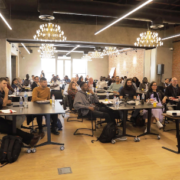African regulators gather to enthrone consumer as king
By MOSHOOD ABUBAKAR
One week after successfully hosting the Commonwealth Telecommunications Organisation (CTO) Forum in Abuja which focused on expanding broadband access, the Nigerian Communications Commission (NCC) in Lagos gathered the continent’s regulators to chart the way forward to making regulations that will advance subscribers’ interest. It will be the first ever of such gathering tagged: First Conference of African Telecommunication Regulators on Consumers Affairs.
Discussions at the two day event with the theme, ‘Harnessing regulatory policies to protect telecom consumers in Africa,’ was kick-started by the Executive Vice Chairman and CEO of the NCC, Dr. Eugene Juwah, represented by Dr. Okechukwu Itanyi, Executive Commissioner (Stakeholders Management) at the NCC. Juwah said the continent has entered another phase of growth marking a shift from the era of licensing operators to ensuring the delivery of quality service by operators to consumers. The telecoms regime has become much more complex and vast in scope thus necessitating a high degree of cooperation by regulators to ensure consumers’ interest across and within borders is well attended to.
“In regulating the telecom sector, NCC is facing an uphill task. As would be expected, there are a number of regulatory risks that are encountered, from time to time, the mindset in dealing with the risks, however has always been to strike a balance amongst various, sometimes conflicting interests affecting stakeholders,” said Juwah who spoke on Regulatory Trends, Challenges and Potential for Growth at the two day event which drew participation from stakeholders that include regulators, operators and consumers advocacy groups.
According to Juwah, while growth in the telecom sector across the continent has been tremendous, it also has its negative flanks which have constituted major challenges to bringing service to the consumers. The challenges include distribution of bandwidth resources, allocation of scarce resources, increasing collaboration with other regulatory agencies and disputes settlements among agencies, erasing multiple taxations and protection of telecom infrastructures as strategic national resource. If regulators are to navigate these snares, to ensure further growth in the telecoms sector, regulators across the continent would have to come together and “cross-pollinate ideas on how to deliver better regulations that will give the consumers a pride of place.”
“I would like to propose that we closely examine some consumer issues peculiar not only to Nigeria but also to some other African countries. These issues are consumer care and quality of service; physically challenged persons and services provisioning; promotion and lottery; dispute resolution; monitoring compliance; enhancing consumer awareness through information dissemination and education; consumer data protection; and consumer rights,” said Juwah to set the agenda for the event that drew participants from over 15 African countries including Angola, Niger, Uganda, Sudan, Liberia, Malawi, Rwanda, Ghana, South Africa, Cameroun, Benin Republic and Nigeria, the host country, and African Telecommunications Union who provided varying and fresh perspectives to issues affecting telecommunication service delivery to consumers across Africa.
Delegates at the conference noted that:
- Deregulation of the telecoms industry has dismantled the monopoly structure and its attendant bottlenecks associated with customers’ frustrations and enhanced competitiveness among operators thus increasing value propositions for the customers.
- Despite the laudable achievements in the telecoms industry across Africa, the challenges faced by consumers include Quality of Service (QoS), billing, adequate education on services, consumer and issues pertaining to seeking redress
- The scope and complexity of telecom regulatory activities on the continent has not only shifted from licensing to consumer obligations, it has also increased in dimension and quantum.
- Convergence and emerging technologies have placed new challenges before African regulators, made regulation more complex and has brought about the need for converged regulation
- Multiple- taxations and multiple-regulations are major challenges in most African countries as they inhibit both operators ability to meet service obligations and full experience of consumers through service affordability and availability
- In the telecoms space everyone is a stakeholder and the impact of the transformation in the industry has rubbed off in every sphere of lives of the people and also led to increased teledensity such that un-served and underserved areas in the continent are increasingly experiencing service provisioning.
- The trajectory for Foreign Direct Investment (FDI) in the telecoms industry is upwards, leading to exponential economic growth which has been manifested in direct and indirect jobs creation across the continent.
- Countries on the continent have experienced general and peculiar challenges based on the culture, values, market principles, business model as well as laws and regulations specific to each regulatory jurisdiction.
- There is need for a sustainable and veritable platform for regulators on the continent to engage in peer review mechanism that will give them ample opportunity to critically focus on the consumer interests in the different climes.
- Consumer is always King and pivotal to the growth of the telecoms industry, as such must be protected
The delegates also resolved:
- To advocate for service neutral licensing that will enable an operator provide telephony, Internet and broadcast services on a single license in the converged ecosystem.
- That telecoms infrastructure should be declared as critical national infrastructure and calls on legislators to pass enabling laws.
- To canvass for a single regional license that will enable an operator in a particular country to operate in any other country within a region once it has a valid operating license from one of the countries in the region.
- To push for equitable access to undersea cable by nations in the continent, particularly the land locked nations on the continent who by reasons of geographical location do not have direct access to the undersea cables
- To encourage regional bodies including national and regional regulators, ATU, African Union Commission, Regional Economic Communities, States Policy Makers to work together to achieve harmonised regulatory document
- To continuously collaborate to ensure that regulators give priority to protecting consumers of ICT services; and to work with the ATU so as to provide the framework for regulators and all other stakeholders to advance consumers’ interest
The NCC has gained global reputation as a proactive regulatory institution for several of its initiatives now consider models for several other regulatory jurisdictions. Part of the Commission milestones include the creation of Consumer Affairs Bureau (CAB), Digital Bridge Institute (DBI), Digital Appreciation Project (DAP), Emergency Communication Centre (ECC); Advanced Digital Access Programme for Tertiary Institutions (ADPTI), Wireless Cloud Programme (WCP) and School Access Programme (SAP). Other are Tertiary Institution Access Programme (TiAP); development of key performance indicators for monitoring quality of services, Subscriber Identity Module (SIM) card registration and launch of Mobile Number Portability (MNP).































